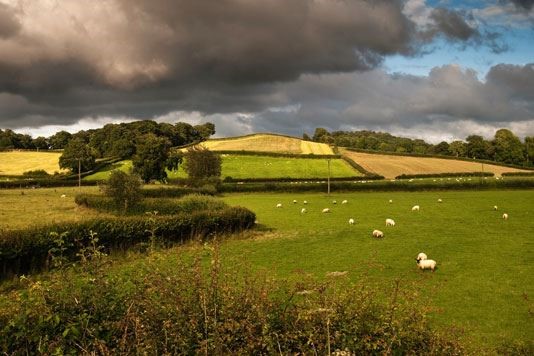What does our unpredictable weather mean for your weekly shop?

A damp 2012 and freezing start to 2013 has severely hit British-grown produce. Andrew Webb looks at how it could affect the availability and cost of our food.
Normally at this time of year I'd be filling lovefood with articles about early summer: strawberries, picnics, barbecues and such. But with the weather being what it is I'm half-minded to update our article on the best warming soups!
What is going on? We've had a White Easter, which led to many new born lambs dying, as the worst hit areas were the high ground of Wales, the Pennines, and Cumbria. At the start of last month the temperature in Aberdeen got as low as -11ºc – brrrr. Are we set for long damp summers and cool grey winters?
And now, the weather...
Terry Marsh is from the Centre for Ecology and Hydrology in Oxford, and a leading weather expert. Here's his view of the year so far: "This year has been somewhat unusual with January to April rainfall totals around 20% below average across much of the country, but reservoir stocks remain healthy due to the truly exceptional 2012 rainfall totals. More notably it has been cold – the coldest January-April since 1987 for Central England." It's this cold snap on top of last year's heavy rainfall that has lead to all sorts of issues for British farmers.
Wheat
The bad weather has severely affected the UK's wheat harvest. I put in a call to Lee Perry at the National Farmers Union to find out how bad things are. "The UK will become a net importer of wheat for the first time since the 1990s this year because of poor yields," he said. "I should point out that actually wheat represents a very small percentage of the costs in producing a loaf – so even seeing large fluctuations in the price of the commodity has little impact on the final price – the end price is always down to the retailer". That's bad news for farmers.
Soft fruits
The news isn't good for the likes of strawberries either. Farmer Anthony Snell from the West Midlands said: "Soft fruit crops under polytunnels and fleece are not growing due to the extreme conditions and low light levels. Yields and production will inevitably be down, but there will be a consistent programme of production throughout the season to ensure that we have enough soft fruit available."
Potatoes
If my shopping is anything to go by, spuds are coming up much smaller than usual. Tim Papworth, a potato farmer in East Anglia, told me: "Nothing has moved on the land for a while. We are well behind on planting potatoes and drilling peas, which will push the whole season back, so I hope for a nice warm summer".
Apples
It's not all bad news, as apples and pears are set to do well this coming autumn. Chris Creed, horticultural consultant at ADAS, told the BBC: "The recent cold weather, a key part of a successful fruit harvest, could see fruit-filled branches." That is, of course, if pollination has happened.
What this means at the checkout
As one farmer once said to me, farming always has been and always will be about the weather. Exactly how this will play out at the supermarket is uncertain, but the general consensus seems to be that food's not going to get any cheaper.
Waitrose CEO Mark Price said in January that we should brace ourselves for increases in the cost of food. And if a recent Bloomberg article is right, the weather and increasing cost of food has led to a fall in sales of 4.1%. So it seems we are heading for a perfect storm (pun partly intended) of bad weather, recession (due to us spending less), and inflation because of smaller harvests and imports.
Have you seen an increase in the cost of your weekly shop? Have you changed what you buy or where you buy it? Let us know in the Comments box below.
The best and worst foods for hot weather
Top 10 recipes for rain or shine
A day in the life of a broccoli farmer
What to do when your BBQ gets rained off
MPs debate food poverty as prices keep rising
North v South: how much do you pay for food?
Comments
Do you want to comment on this article? You need to be signed in for this feature